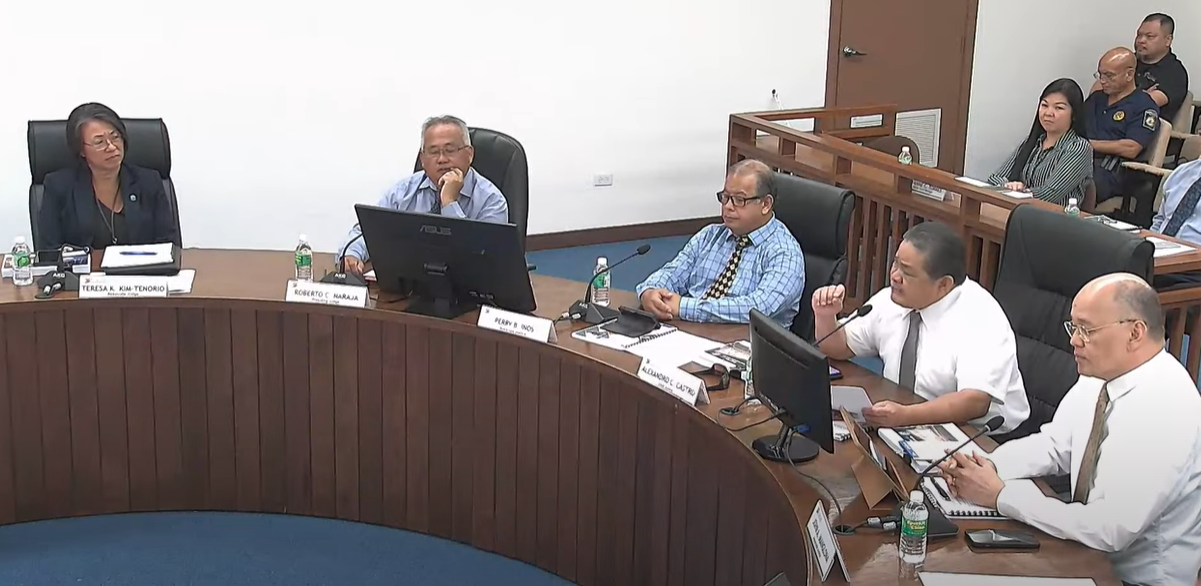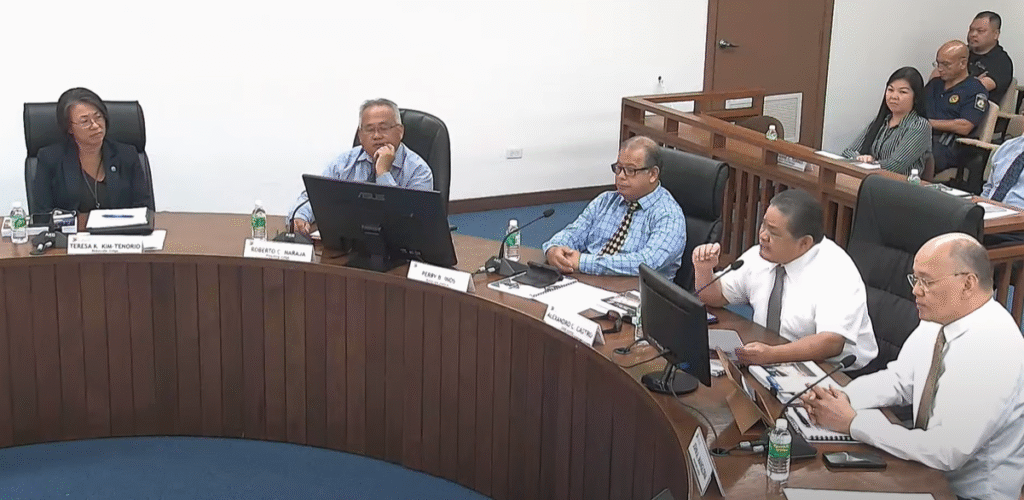
Judiciary officials led by Chief Justice Alexandro Castro, 2nd right foreground, appear before the House Ways and Means Committee during a budget hearing on Monday.
ZEROING out the funding for “all others” is totally unheard of in the 35 years of the local judiciary’s history, CNMI Supreme Court Associate Justice John Manglona told the House Ways and Means Committee during a budget hearing on Monday.
Manglona, Chief Justice Alexandro Castro, Associate Justice Perry Inos, Superior Court Presiding Judge Roberto Naraja, Associate Judge Teresa Kim-Tenorio and Associate Judge Lilian Tenorio appeared before the committee to present the judiciary’s fiscal year 2025 budget proposal.
In his initial and revised FY 2025 budget submissions on April 1 and July 1, respectively, Gov. Arnold I. Palacios proposed $5,397,173 for the judiciary. In FY 2024, the judiciary’s budget amounted to $6,492,148. For FY 2025, the judiciary is requesting $14.8 million.
The House Ways and Means Committee chairman, Rep. Ralph N. Yumul, said the governor’s budget submission for FY 2025 reduced by 10% the allotments for the Legislature and judiciary, “so that makes it even harder for us to move funds around.”
He said they don’t control the funds “so whatever is handed to us is what we have and whatever is short is our fault, that’s the stress we get. I want to make that clear because a lot of times the community blames this body for the proposal that the administration sends to us. And I want to make it clear that we are in support of the judiciary’s submission,” Yumul added.
Noting that the judiciary will get zero funding for “all others,” Manglona said, “We hate to consider the thought of closing some of the services of the judiciary or the thought of closing one or two of our court houses. [That] is not in line with Goal No. 1 in the judiciary’s strategic plan.”
He said perhaps they can take a look at hybrid hearings. “Or [the] mental health court, drug court and others. But it is going to be an impossible task to delete those from Goal No. 1 knowing that there is a prevalence of illness on island.”
Manglona added, “Do we delete some of the staff of the clerk’s office or remove some of our marshals? That is something that we have to talk about in the coming weeks or months. This is totally unheard of in the 35-year history of the judiciary to have zero funding for ‘all others,’ ” he said.
Castro, for his part, thanked the committee, the governor, Speaker Edmund S. Villagomez, Senate President Edith Deleon Guerrero and the rest of the lawmakers “for helping the third branch of the government … survive the fiscal tsunami that is still with us today.”
“Without your assistance, the judiciary would have sunk faster than the Titanic,” the chief justice said. “Our Constitution requires me to submit a budget that accurately reflects the needs of the courts on Saipan, Tinian and Rota. And to do this, we asked all the divisions of the judiciary to submit their needs for fiscal year 2025. An in-house committee of the judiciary then went through the submissions.”
He said some of the judiciary staff, and maybe some of the judges, were not very happy with the submission because “we did not incorporate each and every request they made.”
Had they done so, Castro said, “the judiciary’s budget request would undoubtedly be more than the [close to] $15 million now before you.”
Castro acknowledged that the executive branch has fulfilled its constitutional duty by trying to proportionately allocate available funds. “It is now before you, the legislative branch to carefully examine whether we, the judiciary, have justified our FY 2025 budget submission.”











